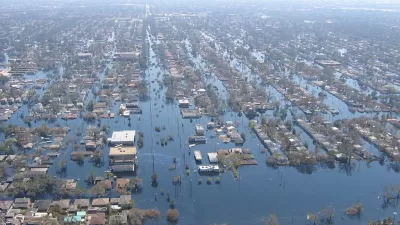In the wake of the slow response by the Trump Administration to the devastation caused by the category 4 Hurricane Maria's direct hit on Puerto Rico on Sept. 20, the U.S. Army Corps of Engineers has been called to rebuild the infrastructure.
President Trump and his administration continue to praise the emergency response to the devastation caused by Maria, and two weeks earlier, by Hurricane Irma, to the 3.4 million American citizens living in Puerto Rico.
Acting Homeland Security Secretary Elaine Duke asserted at a White House press conference on Thursday, "I know it is really a good news story in terms of our ability to reach people and the limited number of deaths that have taken place in such a devastating hurricane."
That didn't sit well with Carmen Yulín Cruz, the mayor of the island's largest (and capital) city, San Juan.
"Well maybe from where she's standing it's a good news story," Yulín Cruz told CNN's Alisyn Camerota after she was played the clip on "New Day." "When you're drinking from a creek, it's not a good news story. When you don't have food for a baby, it's not a good news story. When you have to pull people down from buildings -- I'm sorry, that really upsets me and frustrates me." [Per CNN].
Logistics problem
Thousands of containers filled with "food, water, medical aid, everything," are unable to leave the San Juan port due to a shortage of fuel and truck drivers, a Crowley Maritime official told CNN Thursday. In addition, many of the roads remained blocked due to hurricane debris.
But help is on the way from the U.S. Army Corps of Engineers (USACE), according to a Federal Emergency Management Agency (FEMA) official, report AnneClaire Stapleton, Katherine Grise and Jason Hanna for CNN.
"We're not going to rebuild the power grid overnight, but the US Army Corps of Engineers has just been mission-assigned, in the last 24 hours, to do just that," FEMA Deputy Director Daniel Kaniewski told CNN. "In addition to generators and fuel, we have assigned the US Army Corps of Engineers to rebuild" the US commonwealth's infrastructure.
The USACE, and all other military personnel, will be under the charge of Lt. Gen. Jeffrey Buchanan. If Trump accepts a request by the U.S Senator Marco Rubio (R-Fla.), the Department of Defense, rather than FEMA, will be "in charge of handling the logistics of distributing recovery aid in Puerto Rico."
Rubio acknowledged FEMA's role in providing federal assistance to local governments but said the Defense Department is the "only entity capable of executing a recovery effort of this scale and complexity."
Jones Act
On Thursday the president authorized a 10-day waiver of the Jones Act, a 1920 law that "requires all goods shipped between U.S. ports to be transported by U.S. vessels (and operated primarily by Americans)," reports PBS
"The act has had the unintended consequence of making it twice as expensive to ship things from the US mainland to Puerto Rico as it is to ship from any other foreign port in the world," according to Arizona Republican Sen. John McCain's office.
Two waivers were issued earlier in September in response to requests from the departments of Defense and Energy to facilitate petroleum distribution due to supply disruptions resulting from Hurricanes Harvey and Irma, reports The New York Times.
Sen. McCain, long an advocate for repealing the law, most recently advanced legislation to do so in July. He renewed his call for repeal on Thursday after the waiver was announced.
FULL STORY: FEMA: Army Corps of Engineers to rebuild Puerto Rico's infrastructure

Planetizen Federal Action Tracker
A weekly monitor of how Trump’s orders and actions are impacting planners and planning in America.

Maui's Vacation Rental Debate Turns Ugly
Verbal attacks, misinformation campaigns and fistfights plague a high-stakes debate to convert thousands of vacation rentals into long-term housing.

San Francisco Suspends Traffic Calming Amidst Record Deaths
Citing “a challenging fiscal landscape,” the city will cease the program on the heels of 42 traffic deaths, including 24 pedestrians.

Defunct Pittsburgh Power Plant to Become Residential Tower
A decommissioned steam heat plant will be redeveloped into almost 100 affordable housing units.

Trump Prompts Restructuring of Transportation Research Board in “Unprecedented Overreach”
The TRB has eliminated more than half of its committees including those focused on climate, equity, and cities.

Amtrak Rolls Out New Orleans to Alabama “Mardi Gras” Train
The new service will operate morning and evening departures between Mobile and New Orleans.
Urban Design for Planners 1: Software Tools
This six-course series explores essential urban design concepts using open source software and equips planners with the tools they need to participate fully in the urban design process.
Planning for Universal Design
Learn the tools for implementing Universal Design in planning regulations.
Heyer Gruel & Associates PA
JM Goldson LLC
Custer County Colorado
City of Camden Redevelopment Agency
City of Astoria
Transportation Research & Education Center (TREC) at Portland State University
Jefferson Parish Government
Camden Redevelopment Agency
City of Claremont




























